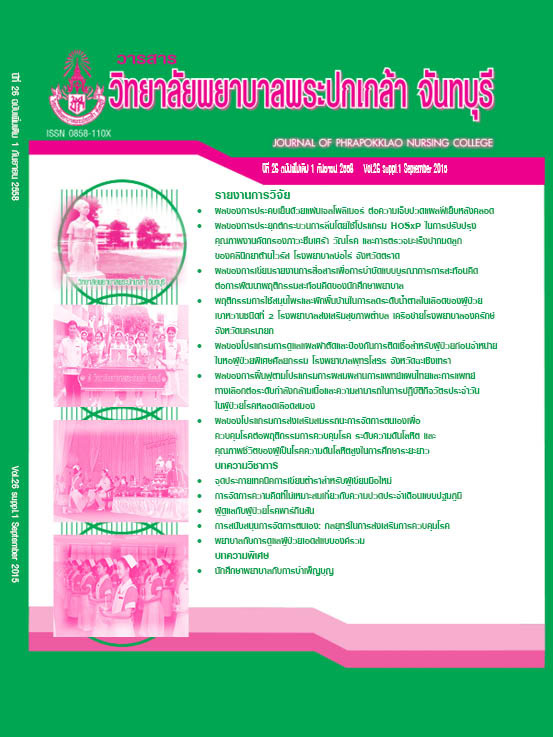Effects of Pre-discharge Program for Surgical Wound Care and Infection Prevention among Patients in the Private Surgery Ward of Buddha Sothorn Hospital, Chachoengsao Province
Keywords:
Wound care program, Surgical wound, Wound infectionAbstract
This quasi-experimental study was based on a one group pretest-posttest design. It aimed to evaluate the effects of the pre-discharge program for surgical wound care and infection prevention on knowledge about and attitude toward surgical wound care among patients in the private surgery ward of Buddha Sothorn Hospital, Chachoengsao Province. Samples were 30 patients aged over 15 years old who admitted in the private surgery ward and had a clean or clean-contaminated surgical wound that needed continuous care at home by patients themselves before the suture removal. Before the samples were discharged from the hospital, they were required to participate in the 2-section program for surgical wound care and infection prevention. Data collection tools developed by a researcher team consisted of a questionnaire to evaluate knowledge about surgical wound care (KR-20 = .57) and a questionnaire to evaluate attitude toward surgical wound care (α = .70). Also, an evaluation form to determine wound infection was used. The intervention was conducted from December 2014 to February 2015. Data were collected before and after implementing the program as well as in 2 weeks later. Statistics used for data analysis included frequency, percentage, mean, standard deviation, repeated one-way ANOVA, and multiple comparison by Bonferroni method.
The results revealed that:
1. After participating in the program and in 2-week follow up, samples’ knowledge about surgical wound care was significantly higher than before participating in the program (MD = 2.50, p < .001 and MD = 2.87, p < .001, respectively). However, samples’ knowledge after participating in the program and in 2-week follow up were not significantly different.
2. Before and after participating in the program, samples’ attitude toward surgical wound care was not significantly different. In contrast, in 2-week follow up, samples’ attitude toward surgical wound care was significantly higher than those before (MD = 3.16, p < .001) and after participating in the program (MD = 2.23, p < .05).
3. After implementing the program, there was no incidence of surgical wound infection among the samples.
This study suggested that the pre-discharge program for surgical wound care and infection prevention should be fostered in the hospital in order to promote surgical wound care among patients and reduce the incidence of surgical wound infection.
References
จิณพิชญ์ชา มะมม, พิชัย จันทร์สวัสดิ์, ศรพร เนียมฤทธิ์, และไพรัช ใบครุธ. (2556). ผลของรูปแบบการพัฒนาทักษะการดูแลต่อการหายของแผลในผู้ป่วยแผลกดทับ. วารสารวิทยาศาสตร์และเทคโนโลยี, 21(7 ฉบับพิเศษ), 609-619.
ณัฐชยา พลาชีวะ. (2542). ผลของการดูแลสุขภาพที่บ้านต่อความรู้และการปฏิบัติตามคำแนะนำในการดูแลตนเองของผู้ป่วยศัลยกรรมกระดูกระยะพักฟื้น (วิทยานิพนธ์ปริญญามหาบัณฑิต). ชลบุรี: มหาวิทยาลัยบูรพา.
นภารัตน์ บัวศรีใส. (2555). ปัจจัยที่มีความสัมพันธ์กับความสามารถในการดูแลบาดแผลชนิดเปิดของพยาบาลวิชาชีพแผนกศัลยกรรม (วิทยานิพนธ์ปริญญามหาบัณฑิต). ชลบุรี: มหาวิทยาลัยบูรพา.
นิโรบล กนกสุนทรรัตน์. (2549). สรีรวิทยาการหายของบาดแผลเฉียบพลันและเรื้อรัง. ใน เอกสารประกอบการประชุมวิชาการเรื่อง การพยาบาลผู้ป่วยที่มีทวารเทียมที่มีรูเปิดที่ผิดปกติระหว่างช่องอวัยวะภายในร่างกายและผิวหนัง และที่มีแผลเรื้อรัง. หน้า 7-11. มหาวิทยาลัยมหิดล กรุงเทพฯ.
ปนัดดา ตะปานนท์. (2552). ผลของการใช้โปรแกรมการวางแผนจำหน่ายเพื่อป้องกันการเกิดแผลกดทับสำหรับผู้ดูแลผู้ป่วยที่มีความเสี่ยง. สืบค้น วันที่ 15 กันยายน 2557, จาก http://www.intranet.rajburi.org/dept/medillus/km/poster%20pdf2552/030.pdf
มณกร ศรีแป๊ะบัว. (2554). ผลของโปรแกรมการพยาบาลระบบสนับสนุนและให้ความรู้ต่อการรับรู้ความสามารถในการดูแลเท้า และพฤติกรรมการดูแลเท้าในผู้ป่วยเบาหวานกลุ่มเสี่ยงต่อการเกิดแผลที่เท้า (วิทยานิพนธ์ปริญญามหาบัณฑิต). ชลบุรี: มหาวิทยาลัยบูรพา.
โยธิน พลประถม. (2551). ความรู้ ทัศนคติ และการมีส่วนร่วมทำกิจกรรมในโครงการบริหารคุณภาพทั่วทั้งองค์กรของพนักงานสายปฏิบัติการร้านสาขา บริษัท ซี.พี. เซเว่น อีเลฟเว่น จำกัด (มหาชน) กรณีศึกษา: เขตปฏิบัติการภาคเหนือของกรุงเทพมหานคร (วิทยานิพนธ์ปริญญามหาบัณฑิต). กรุงเทพฯ: มหาวิทยาลัยราชภัฏพระนคร.
ศูนย์อนามัยที่ 11. (2556). บาดแผลให้หายเร็ว. สืบค้น วันที่ 10 กรกฎาคม 2557, จาก http://www.hpc11.go.th/intranet/index.php?topic=849.msg3946#msg3946.
สังคม นนท์พิพัฒน์, วัชรพงษ์ เรือนคำ, และพัชรา ก้อยชูสกุล. (2557). ความรู้ ทัศนคติ พฤติกรรม และการมีส่วนร่วมในการป้องกันและควบคุมโรคหนอนพยาธิของอาสาสมัครสาธารณสุขประจำหมู่บ้าน ตำบลนางแล อำเภอเมือง จังหวัดเชียงราย. วารสารสาธารณสุขล้านนา, 10(1), 53-71.
สุนทร บุญบำเรอ. (2557). พฤติกรรมความปลอดภัยในการทำงานของพยาบาล ในโรงพยาบาลมหาราชนครราชสีมา จังหวัดนครราชสีมา. วารสารวิทยาลัยพยาบาลบรมราชชนนี นครราชสีมา, 20(2), 82-92.
อัสญาณ์ มงคล, และกนกอร พูนเปี่ยม. (2554). ประสิทธิผลของการใช้โปรแกรมสอนสุขศึกษาในการดูแลตนเองของผู้ป่วยแผลติดเชื้อที่กระจกตา (corneal ulcer). สืบค้น วันที่ 1 ธันวาคม 2557, จาก www.metta.go.th/nursemain/files/r to r รุ่น 3/ประสิทธิผลการใช้โปรแกรมสอนสุขศึกษาผู้ป่วยแผลติดเชื้อที่กระจกตา.pdf
อนุกูล พลศิริ. (2551). ความรู้ ทัศนคติ และพฤติกรรมการบริโภคอาหารของนักศึกษา มหาวิทยาลัยรามคําแหง. วารสารวิจัยรามคําแหง, 11(ฉบับพิเศษ 1), 49-60.
Bandura, A. (1986). Social foundations of thought and action. New Jersey: Prentice Hall.
Chen, Y. C., Wang, Y. C., Chen, W. K., Smith, M., Huang, H. M., & Huang, L. C. (2013). The effectiveness of a health education intervention on self-care of traumatic wounds. Journal of Clinical Nursing, 22(17-18), 2499-2508.
Cherry, K. (2015). Attitudes. สืบค้น วันที่ 1 ธันวาคม 2557, จาก http://psychology.about.com/od/socialpsychology/a/attitudes.htm
Downloads
Published
How to Cite
Issue
Section
License
Copyright (c) 2015 Journal of Phrapokklao Nursing College

This work is licensed under a Creative Commons Attribution-NonCommercial-NoDerivatives 4.0 International License.
เนื้อความ ข้อมูล และรายการอ้างอิงที่ผู้เขียนใช้ในการเขียนบทความเพื่อลงตีพิมพ์ในวารสารวิทยาลัยพยาบาลพระปกเกล้า จันทบุรี ถือเป็นความคิดเห็นและความรับผิดชอบของผู้เขียน คณะผู้จัดทำวารสารไม่จำเป็นต้องเห็นพ้องด้วยหรือร่วมรับผิดชอบ
บทความที่ได้รับการลงตีพิมพ์ในวารสารวิทยาลัยพยาบาลพระปกเกล้า จันทบุรี ถือเป็นลิขสิทธิ์ของวารสารวิทยาลัยพยาบาลพระปกเกล้า จันทบุรี หากหน่วยงานหรือบุคคลใดต้องการนำส่วนหนึ่งหรือทั้งหมดของบทความไปเผยแพร่ต่อเพื่อวัตถุประสงค์ใด ๆ จะต้องได้รับอนุญาตจากบรรณาธิการวารสารก่อน



